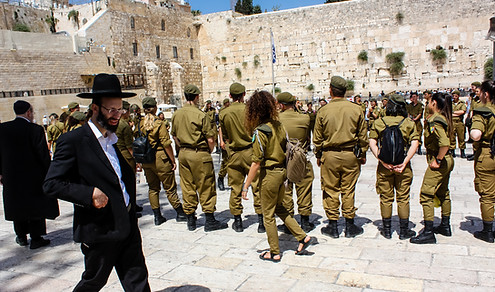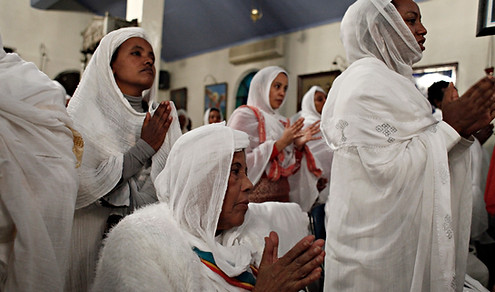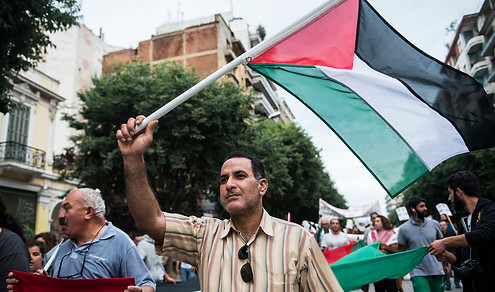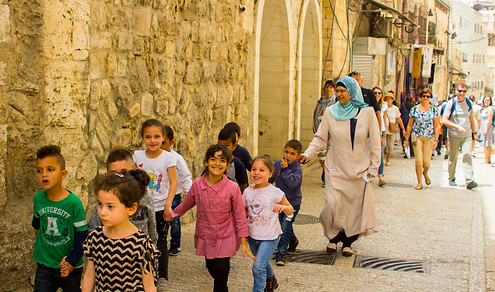
Why are Israelis getting away from each other?
Israel is conducting a centralized policy that harms the cohesion of Israeli society.
Our governance structure has a resource allocation mechanism that discriminates against non-Jewish citizens, even though they receive equal civil rights. In addition, government ministers representing a certain public can disqualify any educational, religious or cultural program of another public. Israel also compels its citizens to get married in its religious institutions. This situation drives many Jews away from their national heritage due to their objection to being coerced. The non-orthodox Jewish streams are not recognized by the country. Similarly, many members of the Palestinian community in Israel refuse to cooperate with the state and feel the need to protect themselves from having 'the Israeli identity' imposed on them. Thus extremists who wish to close ranks and avoid compromise are getting stronger and the Israeli democracy is being torn apart.
Outside Israel, we believe that the Israeli communities in the West Bank have the potential to be part of the solution to the Israeli-Palestinian conflict, and even to strengthen Israel's security and the Jewish connection to their historic land. However, today, in practice, the Israeli settlements in the West Bank violate Palestinian rights, international law and also the cohesion of the Jewish people.
Over the years, several attempts have been made to resolve the Israeli-Palestinian conflict. Nevertheless, the confrontation remains, among other things because no solution has been found to the problem of the Palestinian refugees from 1948, because of the Israeli occupation and Palestinian terrorism in the West Bank and Gaza Strip. These problems perpetuate Israel's ongoing strengthening at the expense of Palestine. The 1990s' peace process did not try to change the structure of the relationship between the nations, but only to set a border and separate between them, and this was one of the reasons why it failed.
This policy both inside and outside the state of Israel creates Win-Lose relations between the political groups in Israel, as well as between Israel and the Palestinians and between Israel and the diaspora Jews. We accumulate power at the expense of the other. As a result, Israeli society is deteriorating. Many of us feel that there is no proper equality between Jews and Arabs or between the religious and secular streams within the Jewish people, and on the other hand, orthodox Jews fear that 5-10% of Israeli couples marry through interfaith marriages. Within the Jewish majority there are those who reject the Israeli occupation of the West Bank and there are those who cannot give up the idea of settlement in all parts of the Eretz Israel (Historic Land of Israel). Some commemorate the Palestinian Nakba and some fear it. Many groups are being excluded from the center of Israeli consensus: traditional Jews in state schools, reform Jews, Israelis who are not Jewish according to Orthodox Jewish law, the Palestinian community in Israel, LGBTs etc.
Therefore we are proposing the Equal Partners program, based on a Win-Win principle: all political groups within Israel will be strengthened together, as well as the State of Israel and the Palestinians, without any side leaving its fate in the hands of the other. We call for the establishment of a separate Palestinian state within the 1967 borders with a safe Jewish minority, alongside the establishment of a federal Jewish and democratic constitution in Israel with an enlarged and equal Palestinian minority. Our federal approach recommends the forming of non-territorial constitutional communities which would provide religious and cultural services in Israel.

Why do many Israelis feel like second rate citizens
In the current situation in Israel, the government has very centralized authorities in areas that concern the personal identity of each citizen. Our governance structure has a resource allocation mechanism that discriminates against non-Jewish citizens, even though they receive equal civil rights. In addition, government ministers representing a certain public can disqualify any educational, religious or cultural program of another public. Israel also compels its citizens to get married in its religious institutions. This situation drives many Jews away from their national heritage due to their objection to being coerced. The non-orthodox Jewish streams are not recognized by the country. Similarly, many members of the Palestinian community in Israel refuse to cooperate with the state and feel the need to protect themselves from having 'the Israeli identity' imposed on them.
Thus extremists who wish to close ranks and avoid compromise are getting stronger and the Israeli democracy is being torn apart. This results in a zero-sum power game that rips Israeli society as well as the Israeli connection with diaspora Jews.
In Equal Partners program Anahnu movement proposes an innovative federal Jewish and democratic Israeli constitutional model. We propose that every group of citizens comprising 6% or more of the general population would be able to establish its own independent constitutional community, with no territorial authorities, which would provide its members with religious and cultural services. These services will include all known religious and cultural institutions, alongside formal education in history, bible, literature and educational hours at school, as well as informal education.
The central federal government will be in charge of all other government functions, including health, policing, transportation, defense, welfare and foreign relations, and its state symbols will be Jewish, as they are today. At the same time, several changes in constitutional articles will be made: the central government will be neutral regarding the status of religion, a new stanza will be added to the national anthem, in which reference will be made to the partnership of all constitutional communities in Israel, a civics curriculum will be shared by all, and the day after Independence Day will mark the covenant for the unity of all Israeli citizens whoever they may be. Changing these articles of the constitution will be possible with a 75% majority in the parliament or in a referendum.
Through the new federal model we are proposing, Israeli citizens will gain full individual freedoms. Without the compulsion we have today, the citizens will choose whether and what they prefer to practice from the Jewish heritage, and their national identity will be strengthened. The Palestinian citizens of Israel will also undergo a similar process of strengthening their national heritage. The national covenant between all the constitutional communities will consolidate into a common Israeli civic identity.

Is there discrimination against Arabs in Israel?
The state of Israel was established by the Zionist movement, based on the Jewish people's natural and historical right to self-determination. But in contrast to the core of Zionism's democratic values, Israel is a democracy that shifts cultural, demographic and land resources to the Jewish majority. Thus, for example, Israel has the Law of Return, which allows all Jews around the world to come and live in Israel, but the state of Israel does not recognize the Palestinian Right of Return, which allows the Palestinian refugees to return to their homeland. There are Israeli institutions that strengthen the Jewish stand in the country, like the Jewish National Fund and the Jewish Agency, but there are no similar institutions for the Palestinian citizens of Israel, and the recently enacted National Law perpetuates this discriminatory reality. The state's symbols are only Jewish, without any addition that would symbolize a shared civilian covenant.
Therefore, in order to create full equality and leave some hope for an appropriate and prosperous constitutional arrangement, we have to recognize the Arab minority in Israel as a Palestinian constitutional community, as we propose to do in our Equal Partners program for a federal Jewish and democratic constitution.

Is it possible to reach an Israeli-Palestinian agreement?
The Israeli-Palestinian conflict has been prolonging for many years, because in the past hundred years the Israelis have gotten stronger at the expense of the Palestinians. Both sides are responsible for the situation that ensued: in order to establish a Jewish state with a Jewish majority, the Zionist movement brought Jews from all over the world and gave them resources of land, security, and culture. But by doing so it harmed the Palestinian lands and markets, treating them with no responsibility or solidarity. The Palestinians, on their part, became fixated with the notion that a Jewish state had no right to exist, due to their refusal to acknowledge Jewish national history. Therefore, a violent confrontation arose between both sides during the British mandate.
Over the years, several attempts have been made to resolve the Israeli-Palestinian conflict. Nevertheless, the confrontation remains, among other things because no solution has been found to the problem of the Palestinian refugees from 1948, because of the Israeli occupation and Palestinian terrorism in the West Bank and Gaza Strip. These problems perpetuate Israel's ongoing strengthening at the expense of Palestine. The 1990s' peace process did not try to change the structure of the relationship between the nations, but only to set a border and separate between them, and this was one of the reasons why it failed.
Only when Israel and Palestine can grow stronger together, will there be enough trust to lead the way to solving the conflict. Thus, we need to create an equation of mutual prosperity, based on the historical rights of both sides, without requiring either of them to leave its fate in the hands of the other.
Regarding borders and security, we believe that the Israeli communities in the West Bank have the potential to be part of the solution to the Israeli-Palestinian conflict, and even to strengthen Israel's security and the Jewish connection to their historic land. However, today, in practice, the Israeli settlements in the West Bank violate Palestinian rights, international law and also the cohesion of the Jewish people. In our opinion, it is impossible to continue with this reality. We believe that change should be made through creative ideas about the Settlements and the Right of Return.
Therefore, we propose a social and political process that would last 50 years: Immediately upon signing of the political agreement, and as soon as possible, a separate Palestinian state alongside Israel will be established within the 1967 borders. The Palestinian government will give the Israeli citizens living in the West Bank the option to stay at their homes, under Palestinian law, as citizens with equal rights and duties and with a non-territorial Jewish autonomy for religious and cultural education - or to be evacuated. Israel on its part will pay compensation to the to the entire settler community, and especially to those who will be evacuated or will choose to leave their homes.
The security responsibility will be passed on to the Palestinians, but the IDF will remain in the limited perimeter defense of the settlements. A substantiated cause for any kind of threat for the wellbeing of Israeli citizens will allow the IDF independent entry into all territories of the Palestinian state for recurrent time periods under international supervision. After a probation period and according to the situation that arises, the IDF will withdraw and be allowed to enter the territories only in a state of emergency.
Regarding the Right of Return, Israel will recognize the Palestinian Right of Return, and every refugee will be allowed to choose whether to accept Israel's law and authority and wait his/her turn to become an Israeli citizen, move to the Palestinian state, or receive compensation.
However, the naturalization of the Palestinian refugees in Israel will be limited, in order to maintain a solid Jewish majority of 70% of all Israeli citizens, and they will be properly and gradually absorbed by establishing new Palestinian settlements or being integrated into existing ones. The outline for the civil status of Israeli citizens in Palestine and for the compensation to Palestinians for past events will be discussed within the agreement of the Israeli and Palestinian governments. At the end of the political process, the citizens of both countries will be allowed to carry out social and economic cooperation, fully and freely.
Regarding Jerusalem, East Jerusalem will be the capital of Palestine, and West Jerusalem will be the capital of Israel. Due to the fierce dispute over sovereignty in the Temple Mount compound, and in order to avoid the dead end in which we are at present, it should be agreed that any solution regarding the future of the compound will be decided upon with full agreement between the parties concerned and not imposed by anyone. Therefore, we propose that the Al-Aqsa compound be transferred to full Palestinian sovereignty, and a state institution for the Jewish heritage in Jerusalem be built next to the southern wall, outside the mosque compound. The State of Israel will subsequently make a formal request to the Palestinian State to allocate a prayer area for Jews on the Temple Mount and to allow the Israeli Antiquities Authority to carry out archeological excavations there. The Palestinians will either refuse or grant the request, according to their position. This solution is much better than the current situation today.
In the interim period, before reaching a full political agreement, action must be taken to establish a modern and stable Palestinian state with a secure Jewish minority. To this end, new villages and social institutions should be established in Area C, such as student villages, in order to create a social and economic infrastructure for the future Palestinian state. In addition, Israelis living in the West Bank who declare their willingness to live in the future in the Palestinian state, should be supported and recognized as legitimate future Palestinian citizens. They will be able to increase economic and social cooperation between them and the Palestinian residents in their vicinity. At the same time, we will support the Israeli government's security activity against terrorism by all legal means available.
However, settlers who continue to act contrary to international law, and continue to harm Palestinian rights and Palestinian life, or refuse to become citizens of the future Palestinian state, will be evacuated and compensated by the Israeli government before the full political agreement is signed. The Anahnu movement will act to implement these ideas in the West Bank with the legitimate consent of the Government of Israel and the Palestinian Authority.

Is Muslim-Israeli reconciliation possible?
As part of our proposal for a federal Jewish and democratic constitution, the Muslim public in Israel will be allowed to establish a constitutional community with its own religious and cultural institutions. The Jewish symbols of the central federal government will also include civic symbols common to all citizens of Israel, and the Al-Aqsa Mosque, which is sacred to Islam, will be transferred to the sovereignty of the Palestinian state.
Immediately after the implementation of the plan, the Arab parties in the Knesset will be able to continue promoting their bill to define Israel as 'a state of all its citizens' or a binational state, if they succeed in persuading a majority of 75% of Israel's citizens. Therefore we assume that these principles should enable the Muslim public to support the proposed solution as well.

What is Anahnu movement doing in the field?
We are establishing groundbreaking social institutions for mutual partnerships between national, religious and secular groups in Israel.
As a first step, we are establishing student villages for common and diverse populations in Israel. The villages will provide the program participants with cheaper housing and help them find their way into the private job market. In return, they will do volunteer work for the community and participate in a populations studies program. We are also working to produce joint tours and encounters to bring together a variety of groups among the Jewish people, as well as Jews and Palestinians, in order to create new symbols of an Israeli shared society. Furthermore, we are promoting a project on the Sabbath which will allow cultural and recreational institutions to operate in a format agreed upon by the secular public, the heads of the ultra-orthodox public and the directors of cultural institutions, in order to create a new unity on the Sabbath day. Later on we shall address the establishment of additional institutions for partnerships between Israeli groups that are far apart from one another, for the sake of all Israeli citizens whoever they may be.



